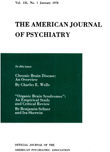Time-Limited Sensitivity Groups for Medical Students
Abstract
Dehumanizing trends in medical education have been reported and discussed extensively. In response to this problem, the opportunity to join a voluntary, time-limited, unstructured sensitivity group was offered to medical students during their clinical rotation in psychiatry. These groups proved to be safe forums for experiential education in which students could increase their capacity to respond sensitively to themselves and others. This paper describes three phases of the group process, the role of the group leader, and the reactions of the participating students.
Access content
To read the fulltext, please use one of the options below to sign in or purchase access.- Personal login
- Institutional Login
- Sign in via OpenAthens
- Register for access
-
Please login/register if you wish to pair your device and check access availability.
Not a subscriber?
PsychiatryOnline subscription options offer access to the DSM-5 library, books, journals, CME, and patient resources. This all-in-one virtual library provides psychiatrists and mental health professionals with key resources for diagnosis, treatment, research, and professional development.
Need more help? PsychiatryOnline Customer Service may be reached by emailing [email protected] or by calling 800-368-5777 (in the U.S.) or 703-907-7322 (outside the U.S.).



